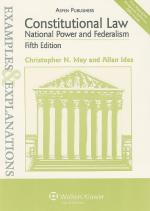|
This section contains 3,061 words (approx. 11 pages at 300 words per page) |

|
Federalism and its related terms (e.g., federal and federation) refer to a type of government that is established voluntarily to achieve unity while preserving diversity by constitutionally uniting separate political communities into a single limited, but encompassing, political community, such as a nation-state like the United States of America. Power is divided and shared in a federal system between (1) a general (or national) government that has certain areawide (or nationwide) responsibilities, such as national defense and monetary policy, and (2) constituent territorial governments (e.g., states, provinces, or cantons) that have broad local responsibilities such as highways, health care, and policing.
A key feature of a federal polity is that both the national (or federal) government and the constituent governments act directly on the people by enacting laws (e.g., criminal laws, tax laws) that directly affect the individuals within their jurisdiction. Furthermore, each order (or level) of...
|
This section contains 3,061 words (approx. 11 pages at 300 words per page) |

|


